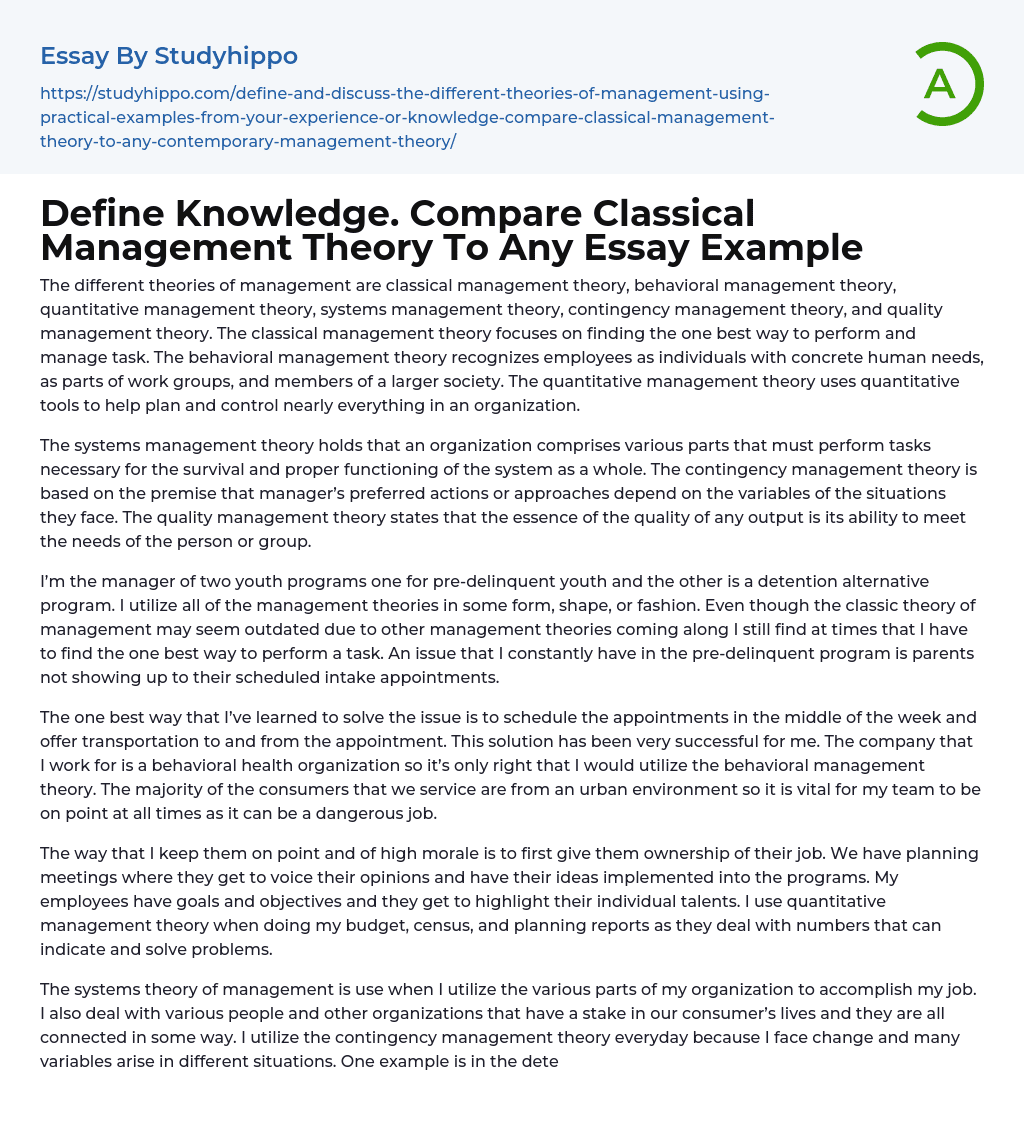

Define Knowledge. Compare Classical Management Theory To Any Essay Example
The various theories of management, including classical management theory, behavioral management theory, quantitative management theory, systems management theory, contingency management theory, and quality management theory each have different approaches. The classical management theory focuses on finding the most efficient methods for task performance and task management. The behavioral management theory recognizes that employees have individual human needs and are also part of work groups and society in general. The quantitative management theory uses quantitative tools to aid in planning and controlling different aspects within an organization.
According to the systems management theory, an organization consists of different parts that have specific tasks to ensure the overall survival and functioning of the system. On the other hand, the contingency management theory suggests that managers' actions and approaches are influenced by the variables i
...n the situations they encounter. Lastly, the quality management theory emphasizes that meeting the needs of individuals or groups is what determines the quality of any output.
As the manager of two youth programs – one for pre-delinquent youth and the other serving as a detention alternative – I incorporate various management theories in my work. While the classic theory of management may appear outdated amidst the emergence of new theories, I still find occasions where I need to determine the most effective approach for a task. In the pre-delinquent program, a recurring challenge is parents frequently failing to attend their scheduled intake appointments.
Scheduling appointments in the middle of the week and offering transportation has been the most successful method for resolving the issue. Applying behavioral management theory is appropriate since I work for a behavioral health organization. Given that our clients mostly come from urba
areas, it is crucial for my team to remain vigilant due to the hazardous nature of our job.
The key to maintaining my team's focus and motivation is by granting them autonomy in their role. We hold planning meetings where they are encouraged to express their thoughts and have their ideas incorporated into our projects. Each of my employees has specific goals and objectives, giving them the opportunity to showcase their unique abilities. When it comes to budgeting, census, and planning reports, I utilize quantitative management theory as it involves numbers that can identify and resolve issues.
The systems theory of management applies to my utilization of different parts of my organization to accomplish tasks. I also interact with individuals and external organizations that have an interest in our consumers, and they are all interconnected in some manner. I incorporate the contingency management theory on a daily basis as I encounter change and various factors in different circumstances. For instance, in the detention alternative program, we utilize electronic bracelets to monitor youth and have the responsibility of picking them up from home based on court orders.
Each pickup and family is unique, which requires me to adapt my approach in dealing with the youth and their families. This is because they all have varying situations and charges. To ensure the best service for our consumers, their families, the community, and our funding source, I apply the quality management theory. Unlike the classic management theory, which suggests there is a universal best method for performing and managing tasks, the quality management theory recognizes the importance of considering the variables that management and employees encounter on a daily basis.
According to
the classic management theory, employees were instructed to adhere strictly to the methods they were taught without any room for deviation. However, the contingency management theory promotes innovation and encourages managers to think creatively and consider different approaches in order to find the most effective solutions. This theory emphasizes flexibility and the exploration of alternatives when faced with challenges, acknowledging the diversity of modern organizations.
- Leadership and Management essays
- Change Management essays
- Project Management essays
- Knowledge Management essays
- Operations Management essays
- Quality Management essays
- Risk Management essays
- Scientific Management essays
- supply chain management essays
- Performance Management essays
- Time Management essays
- Brand Management essays
- Total Quality Management essays
- Risk essays
- Manager essays
- Leadership essays
- Business Ethics essays
- Board Of Directors essays
- Product Management essays
- Comparative Analysis essays
- Decision Making essays
- Dispute Resolution essays
- Stress Management essays
- Business Management essays
- Brand Equity essays
- Branding essays
- Nike, Inc. essays
- Market share essays
- Razor essays
- Being A Leader essays
- Servant Leadership essays
- Leadership Experience essays
- Leadership Qualities essays
- Incentive essays
- Accident essays
- Awareness essays
- Benefits of Volunteering essays
- Challenges essays
- Childhood Memories essays
- Decision essays
- Driving essays
- Event essays
- Excellence essays
- Expectations essays
- Failure essays
- Farewell essays
- Flight essays
- Gift essays
- Growing Up essays
- Ignorance essays



